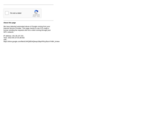
A book covering the start of Western Philosophy and the Ancient World.
- Subject:
- Arts and Humanities
- Philosophy
- Material Type:
- Textbook
- Author:
- Dr. Noah Levin
- Date Added:
- 06/21/2022

A book covering the start of Western Philosophy and the Ancient World.
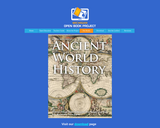
Seventh grade students will review the tools and mental constructs used by historians and geographers. They will develop an understanding of Ancient World History, Eras 1 – 4. Geography, civics/government, and economics content is integrated throughout the year. As a capstone, the students will conduct investigations about past and present global issues. Using significant content knowledge, research, and inquiry, they will analyze the issue and propose a plan for the future. As part of the inquiry, they compose civic, persuasive essays using reasoned arguments.
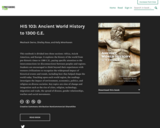
This textbook is divided into three sections: Africa, Asia & Americas, and Europe. It explores the history of the world from pre-historic times to 1300 C.E., paying specific attention to the interconnections (or disconnections) between peoples and regions. Students are encouraged to think beyond their experiences with western civilizations to recognize the widespread impact of historical events and trends, including how they helped shape the world today. Touching upon each world region, the readings investigate the impact of environment, economics, politics, and religion on diverse societies. Key topics are sites of change and integration such as the rise of cities, religion, technology, migration and trade, the spread of disease, gender relationships, warfare and social movements.

Short Description:
The Ancient & Medieval World is a collaborative, open educational resource designed to help students better understand a world long removed from their contemporary experience. The text uses a modular format where students are provided with a brief introduction to each theme, several primary sources, interpretive material written by subject-matter experts, relevant maps and timelines, and visual sources, as well as a glossary of unfamiliar terms. Each module can be used as the foundation of a course assignment or thematic lesson.
Word Count: 75897
ISBN: 978-1-989864-59-3
(Note: This resource's metadata has been created automatically by reformatting and/or combining the information that the author initially provided as part of a bulk import process.)
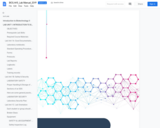
Introduction to Biotechnology II (BIOL1415), provides learners with a practical exploration of a regulated biotechnology workplace. This course is a continuation of Introduction to Biotechnology I (BIOL 1414), and the cornerstone for the Biotechnology Level-One Certificate, as it provides students ample opportunity to master entry-level laboratory workforce skills. This course builds on knowledge in biotechnology, chemistry, & biology, and provides workforce training in areas of regulatory documentation, equipment validation, and teamwork. The goals of this course are to develop core laboratory skills needed in a bioscience lab job; critical thinking and multitasking, teamwork and accountability, accuracy in calculations and experimental analysis, and demonstrate skills associated with working in a regulated laboratory workplace.

Hello Readers, My name is Eddie Joo and I am the co-author as well as the person behind the cover art for this OER. The reason I chose the specific elements on the cover are relatively simple. I dislike the textbooks that just slap random images or things related to the subject and make the cover look really busy. I don't know about you, but any poster or ad that has something to do with Alaska usually includes mountains so I chose the ocean/water instead. Same reason with the animals as the Bear, Wolf, etc. are the go to animals when portraying Alaska so a Dall Sheep, Orca, and an Owl grace the cover. Last but most important to me is the sunrise/sunset gradient. I love seeing both in the winter and is special to me so I added it in as a little Easter egg for me. I hope you enjoy this book! Regards, Eddie
Long Description:
This book is the first edition (Fall 2022) to the exploration of two main core concepts in physiology; Systems Integration, and Homeostasis, in animals at the tissue and organ system level. The flow of this book focuses on how organ systems work together. Foundational homeostatic principles are introduced within the first chapter and threaded throughout the chapters within this text. This text was created by Eddie Joo to supplement students learning within the University of Alaska Anchorage’s Animal Physiology course. The content in this open textbook was adapted from other open textbooks (CC-BY-4.0) resources or created/written by Rachael Hannah and Eddie Joo. This work was funded by an Institutional Development Award (IDeA) from the National Institutes of Health as a Curriculum grant from ALASKA INBRE.
Word Count: 53586
(Note: This resource's metadata has been created automatically by reformatting and/or combining the information that the author initially provided as part of a bulk import process.)
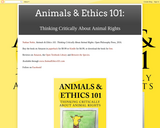
This book provides an overview of the current debates about the nature and extent of our moral obligations to animals. Which, if any, uses of animals are morally wrong, which are morally permissible (i.e., not wrong) and why? What, if any, moral obligations do we, individually and as a society (and a global community), have towards animals and why? How should animals be treated? Why?
We will explore the most influential and most developed answers to these questions – given by philosophers, scientists, and animal advocates and their critics – to try to determine which positions are supported by the best moral reasons.
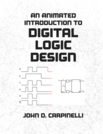
This book is designed for use in an introductory course on digital logic design, typically offered in computer engineering, electrical engineering, computer science, and other related programs. Such a course is usually offered at the sophomore level. This book makes extensive use of animation to illustrate the flow of data within a digital system and to step through some of the procedures used to design and optimize digital circuits.

Adding Examples, Contexts, Discussions to the Recommendation
Word Count: 32440
Included H5P activities: 1
(Note: This resource's metadata has been created automatically by reformatting and/or combining the information that the author initially provided as part of a bulk import process.)

Esta investigación analiza los niveles de ansiedad-rasgo y ansiedad-estado, modificando una ansiedad-estado como un estado emocional inmediato, evolucionando en el tiempo. Mientras que la ansiedad rasgo se refiere a diferencias individuales relativamente estables en la ansiedad. Tuvo como objetivo determinar niveles de ansiedad estado - rasgo en tiempos de pandemia Covid-19 en trabajadores de Red de Salud Angaraes - Huancavelica, 2021. Metodología: investigación básica, nivel descriptivo, método analítico sintético, diseño no experimental, transaccional, descriptivo, técnica utilizada, encuesta, se utilizó Inventario Ansiedad Rasgo Estado (IDARE), se tuvo muestra de 110 trabajadores. Resultados: Concerniente a niveles de ansiedad estado, se evidencia nivel bajo 7,27%, nivel medio 41,82% y 50,91% nivel alto. Respecto a ansiedad rasgo, 6.36%, nivel bajo, 40,91 % nivel medio y el 52,73% nivel alto. Respecto al género para ansiedad estado, para femeninos 2.73% nivel bajo, 20.00% nivel medio y 30.91% nivel alto; para masculinos, 4,55% nivel bajo, 21,82% nivel medio y 20,00% nivel alto. De acuerdo con el género, ansiedad rasgo, femeninos presentan 1,82% nivel bajo, 20.00% nivel medio y 31,82% nivel alto. Género masculino presentan 4,55% nivel bajo, nivel medio 20,91% y 20,91% nivel alto. Respecto a edad, trabajadores de 21 a 30 años presentan ansiedad estado en nivel bajo (2,7%), 22,7% nivel medio, y 9,1% nivel alto; de 31 a 40 años 2,7% nivel bajo, nivel medio 13,6%, y 34,5% nivel alto. Conclusión: Los trabajadores de la Red de Salud Angaraes, presentan nivel alto de ansiedad estado 50,91%, respecto a ansiedad rasgo, presentan un nivel alto 52,73%.

Scroll down or Search for answers to questions about BCcampus Open Education, its resources, and open education practices
Long Description:
A resource developed to answer common questions that the Support team at BCcampus gets asked about open education.
Word Count: 6353
(Note: This resource's metadata has been created automatically by reformatting and/or combining the information that the author initially provided as part of a bulk import process.)
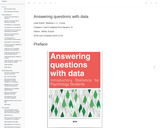
This is a free textbook teaching introductory statistics for undergraduates in Psychology. This textbook is part of a larger OER course package for teaching undergraduate statistics in Psychology, including this textbook, a lab manual, and a course website. All of the materials are free and copiable, with source code maintained in Github repositories.
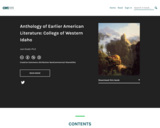
Word Count: 786214
(Note: This resource's metadata has been created automatically by reformatting and/or combining the information that the author initially provided as part of a bulk import process.)
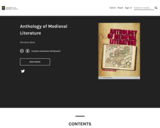
Short Description:
This e-text of Medieval literature provides a variety of readings that can be used for English literature courses and contains public domain, Creative Commons licensed images, and works for which permissions have been obtained to include in this anthology.
Word Count: 137732
(Note: This resource's metadata has been created automatically by reformatting and/or combining the information that the author initially provided as part of a bulk import process.)
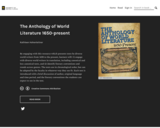
By engaging with this resource which presents texts by diverse world writers from 1650 to the present, learners will: (1) engage with diverse world writers in translation, including canonical and less canonical texts, and (2) identify literary conventions and trends across genres. The texts are in chronological order, but can be adapted by the faculty in whatever way they see fit. Each text is introduced with a brief discussion of author, original language and time period, and the literary conventions the students can expect to see in the text.

Short Description:
Written by Sophocles circa 441 BC, Antigone is an Athenian tragedy. Of the three Theban plays, Antigone is the third in order of the events depicted in the plays, but was the first to be written. The reading order of the Theban plays is: Oedipus Rex, followed by Oedipus at Colonus and ending with Antigone.
Long Description:
Written by Sophocles circa 441 BC, Antigone is an Athenian tragedy. Of the three Theban plays, Antigone is the third in order of the events depicted in the plays, but was the first to be written. The reading order of the Theban plays is: Oedipus Rex, followed by Oedipus at Colonus and ending with Antigone.
Word Count: 11140
(Note: This resource's metadata has been created automatically as part of a bulk import process by reformatting and/or combining the information that the author initially provided. As a result, there may be errors in formatting.)

Hope Scholar Library Workshop
Word Count: 22286
(Note: This resource's metadata has been created automatically by reformatting and/or combining the information that the author initially provided as part of a bulk import process.)

Short Description:
This repository, created through the Washington State Antiracist Curriculum Initiative, contains a variety of resources to assist in designing meaningful curricula that can help students navigate the world of racial hegemony in our society. This is a living work, and one that will continue to grow and change in the years to come, as we learn together as instructors.
Word Count: 13744
(Note: This resource's metadata has been created automatically by reformatting and/or combining the information that the author initially provided as part of a bulk import process.)
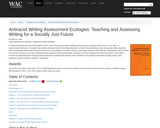
In Antiracist Writing Assessment Ecologies, Asao B. Inoue theorizes classroom writing assessment as a complex system that is "more than" its interconnected elements. To explain how and why antiracist work in the writing classroom is vital to literacy learning, Inoue incorporates ideas about the white racial habitus that informs dominant discourses in the academy and other contexts. Inoue helps teachers understand the unintended racism that often occurs when teachers do not have explicit antiracist agendas in their assessments. Drawing on his own teaching and classroom inquiry, Inoue offers a heuristic for developing and critiquing writing assessment ecologies that explores seven elements of any writing assessment ecology: power, parts, purposes, people, processes, products, and places.
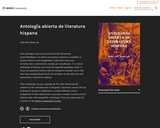
3a. edición
Short Description:
Una antología crítica de textos literarios del mundo hispanohablante. Se enfoca en autores canónicos y también se intenta incluir voces marginadas. Cada texto tiene una introducción y anotaciones creadas por estudiantes. // A critical anthology of literary texts from the Spanish-speaking world. A focus on canonical authors and an attempt to include voices that have been marginalized. Each text includes an introduction and annotations created by students. This Anthology was put together by Dr. Julie Ward and the students in her Introduction to Hispanic Literature course. We are looking for faculty to implement a similar Edición Crítica assignment in their classrooms to produce student-created critical editions that will expand the Anthology. If you are interested, let us know in the Rebus Community Forum.
Word Count: 90805
(Note: This resource's metadata has been created automatically by reformatting and/or combining the information that the author initially provided as part of a bulk import process.)